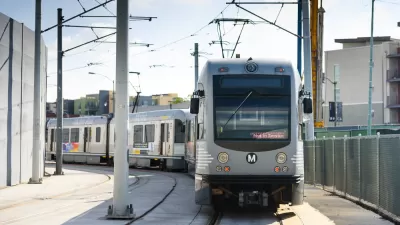Mayor Jesse Arreguín's charges about permissible heights, demolition of rent-controlled housing and displacement that would result from Senate Bill 827 by Sen. Wiener are refuted in the Berkeleyside article, though the latter two have resonance.

"New proposed legislation, introduced by Sen. Scott Wiener [D-San Francisco] and co-authored by Sen. Nancy Skinner [D-Oakland], that would require California cities to allow denser, taller housing developments near transit hubs and bus lines, has ignited controversy in Berkeley and nationally," reports Janis Mara for Berkeleyside on Jan. 22.
With some limitations, SB 827 would eliminate restrictions on the number of houses that can be built within a half-mile of BART and within a quarter-mile of major bus routes, including Muni and AC Transit. It would also block cities from mandating parking requirements [at those locations].
Mara adds that while the bill "would override certain local zoning rules in those areas to permit homes to be built nearby, the local permitting and approval processes would not be affected." However, if the cities haven't met their state-mandated regional housing requirements, as is the case with 97.6 percent of cities and counties in the state, Wiener's "by-right housing" bill from last year, SB 35, would kick in.
But [SB 827] has drawn strong opposition from many who believe it would deprive cities of their rights to control their own zoning and could also lead to unwanted density. In fact Berkeley Mayor Jesse Arreguín characterizes the bill as “a declaration of war against our neighborhoods.”
So what specifically has the Berkeley mayor so stirred up?
“It allows 85-foot buildings throughout Berkeley and the state of California with no protection against demolition of rent-controlled housing, with no guarantee the cities will get benefits out of the out-of-scale buildings built,” the mayor said.
Sounds a bit like what the Sierra Club characterized as a "heavyhanded" approach to housing in their recent letter [pdf] to Wiener in opposition to his bill. Mara corrects the mayor's first assertion:
In fact, the provisions of the bill governing 85-foot buildings only apply to buildings on streets at least 45 feet wide and one block from transit hubs such as BART.
“Not that many areas of Berkeley have 45-foot streets,” said Thomas Lord, a housing policy advocate who is a member of Berkeley’s Housing Advisory Commission.
Senate co-author Nancy Skinner, who represents Berkeley and was first elected to its city council in 1984, addressed the mayor's assertion about the demolition of rent-controlled buildings.
“I think it’s always good for officials to read a bill before they use incendiary language to describe it,” Skinner said. “First off, the bill does not touch any local government’s demolition controls..."
Lord suggested that SB 827 could lead to displacement of residents in some areas though, which Alex Casey, a policy analyst for Zillow Research, disputed.
“Much of price growth is driven by scarcity,” he said. “What the data show, when you look at the community as a whole, if you are not adding new units, then you are going to see existing units become more and more pricey and unable to sustain the current community members.
“Displacement is often more a product of rising prices and stale buildings than it is a block-by-block transformation,” Casey said.
However, "Wiener has said that he is looking at ways to include anti-displacement provisions directly in SB 827, in particular around demolition controls and affordability requirements," adds Mara.
Bill is receiving national attention
"Berkeley Councilwoman Lori Droste noted that the introduction of the bill is making waves, not just in California, where it’s received coverage in the Los Angeles Times, but nationally; online magazine Slate ran a story about the bill, as did the Boston Globe, running an opinion piece titled, “Go on, California — blow up your lousy zoning laws," notes Mara.
Droste suggested that the bill would undergo several iterations. "You want to get as many people on board as possible,” she said.
Hat tip to Len Conly.
FULL STORY: Berkeley mayor on Wiener-Skinner housing bill: ‘A declaration of war against our neighborhoods’

Planetizen Federal Action Tracker
A weekly monitor of how Trump’s orders and actions are impacting planners and planning in America.

Maui's Vacation Rental Debate Turns Ugly
Verbal attacks, misinformation campaigns and fistfights plague a high-stakes debate to convert thousands of vacation rentals into long-term housing.

Restaurant Patios Were a Pandemic Win — Why Were They so Hard to Keep?
Social distancing requirements and changes in travel patterns prompted cities to pilot new uses for street and sidewalk space. Then it got complicated.

In California Battle of Housing vs. Environment, Housing Just Won
A new state law significantly limits the power of CEQA, an environmental review law that served as a powerful tool for blocking new development.

Boulder Eliminates Parking Minimums Citywide
Officials estimate the cost of building a single underground parking space at up to $100,000.

Orange County, Florida Adopts Largest US “Sprawl Repair” Code
The ‘Orange Code’ seeks to rectify decades of sprawl-inducing, car-oriented development.
Urban Design for Planners 1: Software Tools
This six-course series explores essential urban design concepts using open source software and equips planners with the tools they need to participate fully in the urban design process.
Planning for Universal Design
Learn the tools for implementing Universal Design in planning regulations.
Heyer Gruel & Associates PA
JM Goldson LLC
Custer County Colorado
City of Camden Redevelopment Agency
City of Astoria
Transportation Research & Education Center (TREC) at Portland State University
Jefferson Parish Government
Camden Redevelopment Agency
City of Claremont





























